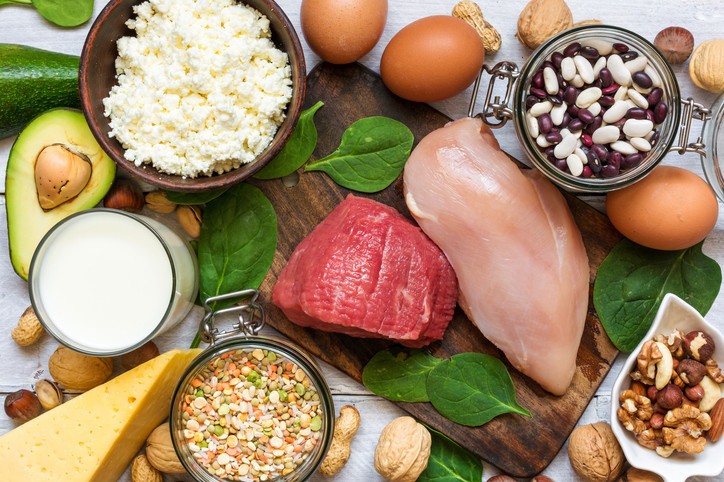Protein is a vital nutrient, crucial for building and repairing tissues, supporting immune function, and maintaining overall health. High-protein diets have gained popularity, especially for weight loss and muscle gain. But is there an upper limit? Specifically, How Much Protein Is Too Much For A Woman? Let’s dive into the details and explore the optimal protein intake for women’s health and well-being.
Understanding Protein Needs
Protein is one of the three macronutrients, alongside carbohydrates and fats, essential for human life. It plays a critical role in various bodily functions, including:
- Building and Repairing Tissues: Protein is the building block of muscles, bones, skin, and hair.
- Enzyme and Hormone Production: Many enzymes and hormones are made of protein.
- Immune Function: Antibodies, which help fight infections, are proteins.
- Transportation and Storage: Protein transports nutrients and stores energy.
Ensuring adequate protein intake is crucial for preventing malnutrition, preserving muscle mass, and supporting overall health.
 Woman preparing a healthy high-protein meal with various protein sources
Woman preparing a healthy high-protein meal with various protein sources
Recommended Daily Protein Intake for Women
The recommended daily allowance (RDA) for protein is often cited as 46 grams per day for women. This recommendation is a baseline to prevent deficiency. However, individual protein needs can vary based on factors like:
- Activity Level: Active women, especially those engaging in strength training, may require more protein.
- Age: Older adults may need more protein to combat age-related muscle loss (sarcopenia).
- Health Conditions: Certain health conditions may influence protein needs.
- Body Weight: A weight-based RDA of 0.8 grams of protein per kilogram of body weight is a more personalized approach. For example, a 150-pound (68 kg) woman would need approximately 54 grams of protein daily (68 kg x 0.8 g/kg).
Some experts advocate for higher protein intake, suggesting that the standard recommendations may be too low for optimal health, while others believe the average diet already includes excessive amounts of protein.
The Risks of Excessive Protein Intake
While protein is essential, consuming too much can have negative consequences. So, how much protein is too much for a woman? Overconsumption of protein can lead to:
- Kidney Stones: High protein diets, particularly those rich in animal protein, can increase the risk of kidney stones.
- Heart Disease: High protein diets that include large amounts of red meat and saturated fat can increase the risk of heart disease.
- Colon Cancer: Similar to heart disease, diets high in red meat may also elevate colon cancer risk. However, plant-based high-protein diets might not carry the same risks.
- Nutrient Imbalances: Focusing solely on protein can lead to neglecting other essential nutrients like fiber, vitamins, and minerals.
- Weight Gain: Excess calories from any source, including protein, can lead to weight gain if not balanced with physical activity.
Determining Your Protein Threshold
Providing a definitive answer to how much protein is too much for a woman is challenging due to the varying individual factors. However, a general guideline for healthy individuals (excluding elite athletes or bodybuilders) is to limit protein intake to no more than 2 grams per kilogram of ideal body weight.
For instance, a woman with a normal body mass index (BMI) and an ideal weight of 140 pounds (64 kg) should aim for a maximum protein intake of around 128 grams per day (64 kg x 2 g/kg).
Tips for Maintaining a Healthy Protein Intake
If you aim for a higher protein intake, consider these recommendations:
- Consult Your Doctor: Discuss your health conditions with a doctor before starting a high-protein diet, especially if you have kidney issues.
- Choose Healthy Protein Sources: Opt for low-fat dairy products, fish, nuts, beans, lean chicken, and turkey. Avoid highly processed carbohydrates and saturated fats.
- Distribute Protein Throughout the Day: Spread your protein consumption across all your meals.
- Prioritize a Balanced Diet: Include plenty of vegetables, fruits, and fiber in your diet. Consider following the Mediterranean or DASH diet principles.
Conclusion
Understanding how much protein is too much for a woman is crucial for maintaining optimal health. While protein is essential, excessive intake can lead to potential health risks. Focus on consuming a balanced diet with healthy protein sources and consult your doctor to determine your individual protein needs based on your activity level, age, and health conditions.